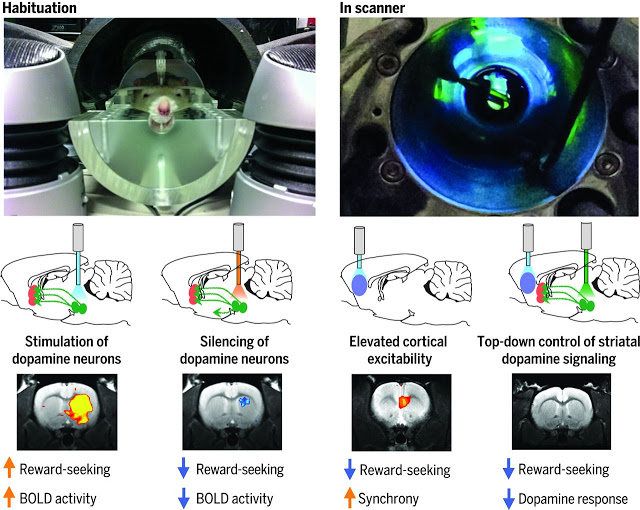Neuroscience

The Neurocomplimenter has come out of retirement to briefly praise a massive (13 pages + 83 page supplement) new tour de force by Ferenczi et al. (2015). The collaborative Stanford/Cornell team — with departmental affiliations in Bioengineering, Neurosciences, Neurobiology & Behavior, Psychology, Psychiatry, Neurosurgery, and Radiology — modeled the scourge of anhedonia (inability to experience pleasure) using a combination of optogenetics and fMRI in awake rats.
Reference
Emily A. Ferenczi, Kelly A. Zalocusky, Conor Liston, Logan Grosenick, Melissa R. Warden, Debha Amatya, Kiefer Katovich, Hershel Mehta, Brian Patenaude, Charu Ramakrishnan, Paul Kalanithi, Amit Etkin, Brian Knutson, Gary H. Glover, Karl Deisseroth. Prefrontal cortical regulation of brainwide circuit dynamics and reward-related behavior. Science 1 January 2016. DOI: 10.1126/science.aac9698
- Ouch, That's Expensive!
As well as hurting your wallet, your brain expects an expensive product to cause you pain too. Researchers have found that in terms of brain activity, whether or not we choose to make a purchase is reflected in a trade-off between regions of the brain...
- Everybody Loves Dopamine
Dopamine is love. Dopamine is reward. Dopamine is addiction. Neuroscientists have a love/hate relationship with how this monoamine neurotransmitter is portrayed in the popular press. wwlp.com thestranger.com [The claim of vagus nerve-stimulating headphones...
- Nineteenth Annual Cognitive Neuroscience Society Meeting
The 2012 CNS Meeting will be held in Chicago from March 31 to April 3. The schedule is packed with three and a half days of symposia, slide sessions, posters, and distinguished lectures. It will be quite an Event, with sessions on Music and the Brain,...
- Employment Opportunity As A Professional Fmri Subject
Apply now! Or at least, that's the implication of this BBC story about the latest neuroimaging paper (Fliessbach et al., 2007) in Science: Men motivated by 'superior wage' [NOTE: so I guess women aren't, eh? we don't know, since they...
- Neuroshopping
We now return to The Neuroshopping Channel!! Before the last commercial break, Brenda had placed a $7 bid on a box of Godiva chocolates. How will her brain respond when she finds out the consequences? Let's take a look. Back to you, Bob Barker! Yes,...
Neuroscience
The New Neurosciences: Preclinical Optogenetic fMRI of Reward Circuitry

Science 1 January 2016
The Neurocomplimenter has come out of retirement to briefly praise a massive (13 pages + 83 page supplement) new tour de force by Ferenczi et al. (2015). The collaborative Stanford/Cornell team — with departmental affiliations in Bioengineering, Neurosciences, Neurobiology & Behavior, Psychology, Psychiatry, Neurosurgery, and Radiology — modeled the scourge of anhedonia (inability to experience pleasure) using a combination of optogenetics and fMRI in awake rats.
Abstract
Motivation for reward drives adaptive behaviors, whereas impairment of reward perception and experience (anhedonia) can contribute to psychiatric diseases, including depression and schizophrenia. We sought to test the hypothesis that the medial prefrontal cortex (mPFC) controls interactions among specific subcortical regions that govern hedonic responses. By using optogenetic functional magnetic resonance imaging to locally manipulate but globally visualize neural activity in rats, we found that dopamine neuron stimulation drives striatal activity, whereas locally increased mPFC excitability reduces this striatal response and inhibits the behavioral drive for dopaminergic stimulation. This chronic mPFC overactivity also stably suppresses natural reward-motivated behaviors and induces specific new brainwide functional interactions, which predict the degree of anhedonia in individuals. These findings describe a mechanism by which mPFC modulates expression of reward-seeking behavior, by regulating the dynamical interactions between specific distant subcortical regions.
Reference
Emily A. Ferenczi, Kelly A. Zalocusky, Conor Liston, Logan Grosenick, Melissa R. Warden, Debha Amatya, Kiefer Katovich, Hershel Mehta, Brian Patenaude, Charu Ramakrishnan, Paul Kalanithi, Amit Etkin, Brian Knutson, Gary H. Glover, Karl Deisseroth. Prefrontal cortical regulation of brainwide circuit dynamics and reward-related behavior. Science 1 January 2016. DOI: 10.1126/science.aac9698
- Ouch, That's Expensive!
As well as hurting your wallet, your brain expects an expensive product to cause you pain too. Researchers have found that in terms of brain activity, whether or not we choose to make a purchase is reflected in a trade-off between regions of the brain...
- Everybody Loves Dopamine
Dopamine is love. Dopamine is reward. Dopamine is addiction. Neuroscientists have a love/hate relationship with how this monoamine neurotransmitter is portrayed in the popular press. wwlp.com thestranger.com [The claim of vagus nerve-stimulating headphones...
- Nineteenth Annual Cognitive Neuroscience Society Meeting
The 2012 CNS Meeting will be held in Chicago from March 31 to April 3. The schedule is packed with three and a half days of symposia, slide sessions, posters, and distinguished lectures. It will be quite an Event, with sessions on Music and the Brain,...
- Employment Opportunity As A Professional Fmri Subject
Apply now! Or at least, that's the implication of this BBC story about the latest neuroimaging paper (Fliessbach et al., 2007) in Science: Men motivated by 'superior wage' [NOTE: so I guess women aren't, eh? we don't know, since they...
- Neuroshopping
We now return to The Neuroshopping Channel!! Before the last commercial break, Brenda had placed a $7 bid on a box of Godiva chocolates. How will her brain respond when she finds out the consequences? Let's take a look. Back to you, Bob Barker! Yes,...
